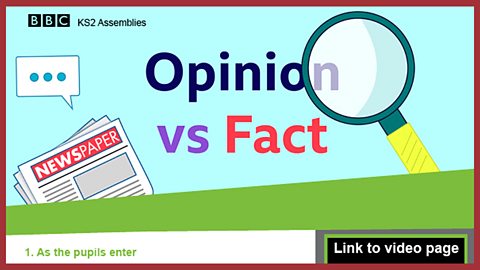In short...
Themes: Separating 'fact' from 'opinion'; fake news and how to counter it; Safer Internet Day.
Summary: In the video at the heart of this assembly primary school pupils consider how difficult it can be to distinguish 'fact' from 'opinion'. They struggle to agree on a variety of statements - such as 'Up is the opposite of down' - and whether they are definitely facts. Their findings highlight the importance of being able to identify what is 'fake news' - false information being endorsed as fact - and consequently this assembly is one you might choose for Safer Internet Day in February.
Resources: the . Before you start the assembly prime another teacher (or a confident older pupil) to help you by putting their hand up and questioning whether the thing you’d said is really true. They should ask you where you heard the news and how you can be sure it’s true.

The video
The video starts with two boys discussing the difference between 'fact' and 'opinion'. They start with the example of Manchester United: it's a fact that United are a football team; just an opinion that they are 'the best team in the world'. They are then joined by other pupils trying to determine whether a variety of statements should be classified as 'facts' or just 'opinions'.
The two boys end by giving an explanation of 'fake news' and why we shouldn’t always believe everything we read on the internet. They encourage us to think about the source of the information and to ask a friend or adult if you aren’t sure whether something is really true.
Opinion...or fact?
- Up is the opposite of down.
- Facts are true.
- Zoos are good for animals.
- Human actions are causing climate change.
- True is the opposite of false.
- You should always listen to adults.

Key links
Download / print the assembly framework ready for use

Click to display the image full-size


Suggested framework
1. Entry music
You could play a song that has the word 'truth' in the title - such as . Or .
2. Introduction
Begin by telling the assembly that you heard something really amazing yesterday and you can’t wait to share it with them. Tell them some exciting (false) news related to your own school - eg Mrs Smith is moving to Australia…or the head teacher has decided to build a swimming pool in the playground. Wait for your primed colleague or pupil to challenge you and ask you where you heard it. Explain that you overheard someone talking about it on the playground yesterday, so it must be true, right? Perhaps you could then explain that maybe you misheard. Or maybe Mrs Smith was just saying she would like to go to Australia one day and you misunderstood.
Link to the video by saying that it's easy to mistake something that isn't true for something that is - and that's what the pupils in the video are trying to explore.
3. The video
Play the video. The duration is 3' 09" and the final words are: '…make sure you don't accidentally spread false information.'
4. After the video
If you didn’t pause the video at key points to answer the questions with your assembly, you could do so now (see above). Or ask some of your own examples of 'opinion vs fact'.
5. Time to talk
Return to the conversation at the start of the assembly and explain that you shouldn’t have shared the news if you weren’t absolutely sure it wasn’t true first. You should have checked first.
Ask pupils if they have ever read something on the internet that turned out not to be true. What should they do if they hear or read something and they aren’t sure if it’s true or not? Encourage them to always check with an adult if they aren’t sure, and never to tell people things that aren’t true.
6. Opportunity to sing
An opportunity to sing your chosen song. Suggestions from ґуПуґ«ГЅ collections below.
7. Opportunity to reflect
Invite pupils to close their eyes and think about the importance of what they have heard today…and the things they will take away from it.
8. Opportunity for prayer
Dear God (or your usual form of address) and:
Help us to know when things we read or hear are true…
When they are opinion…and when they are false.
Help us to be truthful and honest at all times.
Amen.

Suggested songs
Song: 'Keep the golden rules' (All about our school, no 5. Vocal version)
Chorus:
Every day’s a good day
When we keep the golden rules.
Then we’ll get on in a good way
With everyone at school!
Show respect for one another
And different points of view,
And take good care of each other
In everything we do.
Verse 1:
They’re all there for a reason,
So everything is cool,
And every day’s a good day
When we keep the golden rules!
Chorus:
Verse 2:
There are rules for playing every sport
And every kind of game,
To get along together
We need rules just the same!
Chorus:
Every day’s a good day
When we keep the golden rules.
Then we’ll get on in a good way
With everyone at school!
Show respect for one another
And different points of view,
And take good care of each other
In everything we do.
And take good care of each other
In everything we do.

